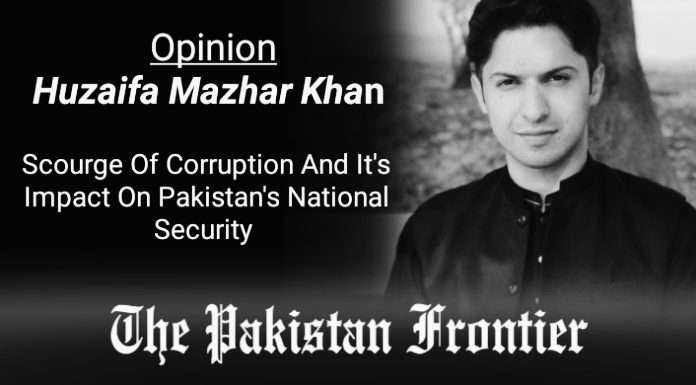Not only our ruling elite but unfortunately some people from our intelligentsia also preach that corruption is a non-issue. They justify this claim by verbalizing that graft exists in every human society. To elaborate their feeble argument, they give the examples of developed countries. So, is corruption really an overexaggerated and irrelevant issue?There are many case studies which elucidates the impact of corruption on a country’s national security. For instance, the United Nations Office on Drugs and Crime (UNODC) published a report in 2010 titled: Transnational Organized Crime and Security which spotted that corruption can facilitate international crimes which includes drug, human trafficking and terrorism. A similar study by RAND Corporation in 2012 highlighted that corruption can weaken the legitimacy of a government and its capacity to provide public services which can pave the way for anarchy that will eventually threaten national security.The question now arises as to which form of corruption is more harmful, that of the public or that of government officials? Allama Iqbal in Asrar e Khudi answered this exquisitely:
آتش جان گدا جوع گداست
جوع سلطان ملک و ملت را فناست
The beggar’s hunger consumes his own soul,But the Sultan’s (ruler) hunger destroys state and religion.Governmental corruption threatens the foundations of democracy. By virtue of their position, officials are required to act in the public’s best interests. When they act corruptly, they destroy the public’s trust in the government and the rule of law by fostering an atmosphere of impunity. As a result, democratic institutions may deteriorate. Second, misuse of authority and misappropriation of public funds are frequent manifestations of corruption of public authorities. Resources that are designed to be utilized for public services like healthcare, education, and infrastructure are syphoned off by dishonest authorities, which can have major repercussions for the welfare of the public. For vulnerable populations in particular, this may result in social inequity and a lack of access to essential services.
Lastly, public official corruption could have a significant impact on national security. In exchange for payments or other benefits, corrupt officials may work together with violent elements, giving them support and protection. This could compromise the government’s ability to uphold law and order by allowing these groups to function with impunity. Hence, the corruption of public office holders is considered more harmful.Khawaja Nizam Ul Mulk the grand Seljuk vizier under whose rule the sultanate enjoyed a period of stability and prosperity, in his famous book Siyasatnama (which is one of the most popular reads on governance) stated that corruption was a major threat to the stability and well-being of society. Inter alia the rulers who are involved in corrupt practices will not only lose the trust of people but also their power.
John Perkins the author of Confessions of an Economic Hitman characterized his work as an “economic hitman,” a person who supported governments and multinational corporations in using debt, bribery, and other types of corruption to exploit developing nations.According to Perkins, the corruption he saw at work had a significant effect on the national security of the countries he worked in. He points out that the huge debts that developing nations gained as a result of his work frequently made them susceptible to outside pressures, such as political interference and military intervention. This in turn sparked violence and instability, which further jeopardized the safety and welfare of the citizens of these nations.
The aforementioned arguments fit in Pakistan’s case. We can see its relevance in NAB amendments 2019 by PDM deteriorated the public’s trust in government. On one side we are struggling to get a loan from the IMF while on the other we witness cases worth billions getting pardoned through anti-graft laws modification. Almost every problem originates from corruption. Energy sector plays an important role in a country’s national security; its significance is vivid in every sector. In Pakistan, there have been contentions of corruption and irregularities in the awarding of contracts to the IPPs (Independent Power Producers), which have led to huge financial losses for Pakistan. Corruption in IPPs has damaged Pakistan’s security by creating a huge burden of circular debt on the economy. The overbilling and other corrupt practices (in the energy sector) have resulted in higher electricity prices for consumers, which has had a negative impact on businesses and individuals alike. Expensive electricity is another reason why our exporter cannot compete with its South Asian rivals in European markets. Also the shortage of electricity overall creates socio economic unrest. In 2018 the famous NADRA scandal came into the news, where the officials were found to be giving fake CNICs to foreigners through bribery and other corrupt practices. We find similar issues when we look at the other sectors. There are many other examples which depict how badly the corruption has damaged our institutions which then creates humongous challenges for our national security. So, we need to get rid of this scourge of corruption if we want to see Pakistan prospering. We cannot detach the issue of corruption from national security.
Author: Huzaifa Mazhar Khan
The author is a Public Policy student and a column writer. He has also worked in DBTV as an Anchorperson.
He tweets: HuzaifaM_Khan

Been an admirer of his work for quite a long time now. Huzaifa has been providing us all with the quality content we need during these times. Well wishes!